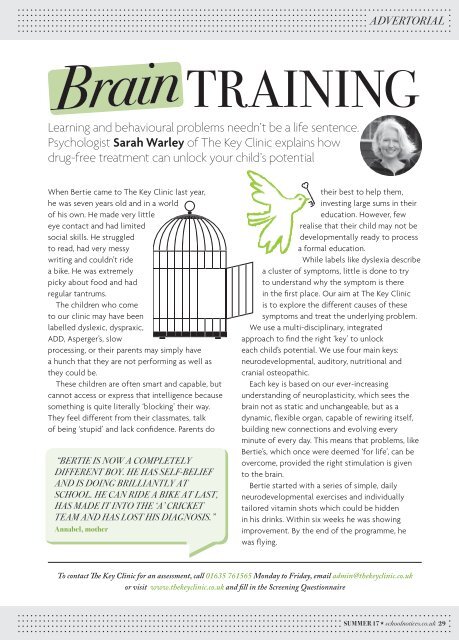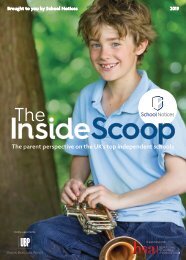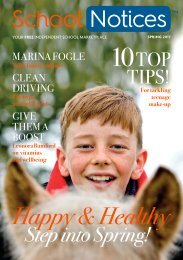Summer Edition 2017
Our new look magazine! Going to 35,000 families at our member schools, all raising funds for great causes.
Our new look magazine! Going to 35,000 families at our member schools, all raising funds for great causes.
Create successful ePaper yourself
Turn your PDF publications into a flip-book with our unique Google optimized e-Paper software.
ADVERTORIAL<br />
BrainTRAINING<br />
Learning and behavioural problems needn’t be a life sentence.<br />
Psychologist Sarah Warley of The Key Clinic explains how<br />
drug-free treatment can unlock your child’s potential<br />
When Bertie came to The Key Clinic last year,<br />
he was seven years old and in a world<br />
of his own. He made very little<br />
eye contact and had limited<br />
social skills. He struggled<br />
to read, had very messy<br />
writing and couldn’t ride<br />
a bike. He was extremely<br />
picky about food and had<br />
regular tantrums.<br />
The children who come<br />
to our clinic may have been<br />
labelled dyslexic, dyspraxic,<br />
ADD, Asperger’s, slow<br />
processing, or their parents may simply have<br />
a hunch that they are not performing as well as<br />
they could be.<br />
These children are often smart and capable, but<br />
cannot access or express that intelligence because<br />
something is quite literally ‘blocking’ their way.<br />
They feel different from their classmates, talk<br />
of being ‘stupid’ and lack confidence. Parents do<br />
“BERTIE IS NOW A COMPLETELY<br />
DIFFERENT BOY. HE HAS SELF-BELIEF<br />
AND IS DOING BRILLIANTLY AT<br />
SCHOOL. HE CAN RIDE A BIKE AT LAST,<br />
HAS MADE IT INTO THE ‘A’ CRICKET<br />
TEAM AND HAS LOST HIS DIAGNOSIS.”<br />
Annabel, mother<br />
their best to help them,<br />
investing large sums in their<br />
education. However, few<br />
realise that their child may not be<br />
developmentally ready to process<br />
a formal education.<br />
While labels like dyslexia describe<br />
a cluster of symptoms, little is done to try<br />
to understand why the symptom is there<br />
in the first place. Our aim at The Key Clinic<br />
is to explore the different causes of these<br />
symptoms and treat the underlying problem.<br />
We use a multi-disciplinary, integrated<br />
approach to find the right ‘key’ to unlock<br />
each child’s potential. We use four main keys:<br />
neurodevelopmental, auditory, nutritional and<br />
cranial osteopathic.<br />
Each key is based on our ever-increasing<br />
understanding of neuroplasticity, which sees the<br />
brain not as static and unchangeable, but as a<br />
dynamic, flexible organ, capable of rewiring itself,<br />
building new connections and evolving every<br />
minute of every day. This means that problems, like<br />
Bertie’s, which once were deemed ‘for life’, can be<br />
overcome, provided the right stimulation is given<br />
to the brain.<br />
Bertie started with a series of simple, daily<br />
neurodevelopmental exercises and individually<br />
tailored vitamin shots which could be hidden<br />
in his drinks. Within six weeks he was showing<br />
improvement. By the end of the programme, he<br />
was flying.<br />
To contact The Key Clinic for an assessment, call 01635 761565 Monday to Friday, email admin@thekeyclinic.co.uk<br />
or visit www.thekeyclinic.co.uk and fill in the Screening Questionnaire<br />
SUMMER 17 ★ schoolnotices.co.uk 29

















